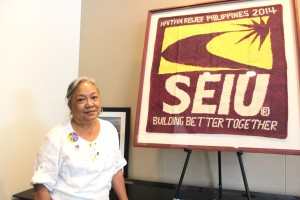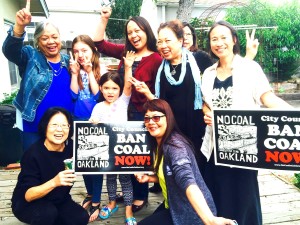
At SEIU’s national headquarters in Washington, D.C., Executive Vice President Luisa Blue will focus on SEIU’s AAPI engagement on comprehensive immigration reform, dismantling structural racism, economic justice in the Fight for $15, and getting Hillary elected. JON MELEGRITO
WASHINGTON, D.C.–“There’s still not very many of us,” says Luisa Blue, who has the distinction of being the first ever Asian American and Pacific Islander (AAPI) to serve as an international union officer. “But we must constantly strive for diversity as that’s the key for advancing a progressive agenda and real change for working families.”
Blue recalls that women and immigrants at one time were denied membership from the nation’s largest labor unions. That policy changed for women in the 1940s and for immigrants in the late 1990s.
As the country observes the 122th anniversary of Labor Day, which honors the diverse movement of working people and their social and economic achievements, Blue says she’s inspired by the possibility of yet another historic milestone: a woman as President of the United States.
“Never in my lifetime did I think a woman would ever be nominated,” she exults. “Now we embark on electing the first woman and sending her to the White House.”
To make that happen, Blue has been traveling across the country from her SEIU Washington, D.C. office to get out the vote for Hillary Clinton in November.
“We have to continue fighting for immigrant rights, for social and racial justice,” she points out. “These are issues that mean a lot to the poor and those who don’t have a voice.”
Top post
Blue, 64, was elected executive vice president by the Service Employees International Union (SEIU) during its Quadrennial Convention in May. Since 2013, she has been chief executive officer of SEIU Local 521, which represents 40,000 public and nonprofit, private-sector workers in California’s central Bay Area region and in the Central Valley.
Her historic election to a top post in the nation’s largest health care, property services and public services union is viewed by friends and co-workers as “a great next step” in a long union career.
“Luisa has dedicated her life to helping workers have a voice at work and build a better future for their families,” said SEIU President Mary Kay Henry at a July event, hosted by the Asian Pacific American Labor Alliance (APALA), honoring Blue.

One of Blue’s (standing, left) proudest moments is joining a protest rally in June with her two granddaughters, union leaders and women’s rights advocates. PATRICIA LEE
“She has been a trailblazer for the AAPI community and continues that tradition as she becomes the first-ever SEIU executive vice president of AAPI descent. We are so energized to have her serve in this role,” said Henry.
n 2013, Blue and Courtni Pugh, another AAPI union leader and former executive director of SEIU Local 99, were sworn in by Henry to the SEIU International Executive Board.
“They strengthen the voice of SEIU’s Asian American and Pacific Islander members, a growing segment of America’s labor movement, and reinforces how the diversity of SEIU’s 2.1 million members is a source of strength for the union,” Henry said at their swearing in.
Adds Maria Castaneda, an APALA National Executive Board member and also a high-ranking AAPI official at SEIU: “The growing diversity of the workforce and union membership will only strengthen in the coming years, and we need to start investing in leaders that reflect our members and the diverse communities we come from. Luisa is an important asset to SEIU especially as we continue to serve one of the largest immigrant populations in the country.”
Union activism
Blue joined the union in 1977 when she worked as a registered nurse (RN) at San Francisco General Hospital. As a member of SEIU Local 400, she started her union activity as a shop steward for the Registered Nurse Chapter.
In 1982, she was elected President of SEIU Local 400 and later president of SEIU Local 790, a large public sector union in Northern California. As organizing director before becoming president, she organized over 10,000 workers in five years. She was also responsible for the successful organizing campaign of airport screeners – predominantly Asian immigrants – at the San Francisco airport.
Blue (left) and SEIU President Mary Kay Henry smile for the cameras at the conclusion of an APALA event in July honoring Blue. SEIU
In 1990, she joined the AFL-CIO Organizing Institute staff when it opened its West Coast office. Two years later, she became SEIU’S lead organizer for healthcare campaigns and later as the union’s Pacific Northwest Organizing Coordinator.
Throughout her career, she has led campaigns to secure collective bargaining rights for county registered nurses, headed a local of over 55,000 public service workers who provide vital community services in California’s Central Valley, and expanded the fight to unite nurses on a national level as a founding member of the SEIU Nursing Alliance.
In August 2001, Blue became the first woman and the first Filipino American to be elected National President of APALA. She was re-elected in 2003. Blue played an instrumental role in developing APALA’s joint organizing program with the AFL-CIO Organizing Institute.
“We are extremely proud of Luisa’s achievements on behalf of workers,” says APALA National President Johanna Puno Hester, who, as International Vice President is also a high-ranking AAPI in AFSCME’s International Executive Board. “Her leadership within APALA has been instrumental in ensuring better working conditions for AAPI families, and I am incredibly excited to continue our work together in this new capacity.”
A fierce advocate
Before her trade union career, Blue was deeply involved in the civil rights activism of the ‘60s and ‘70s. She joined the San Francisco-based anti-martial law movement, which opposed the Marcos regime in the Philippines. She also participated in the Fair Licensure of Filipino Nurses campaign organized by the Union of Democratic Filipinos (KDP). In the Bay Area’s Filipino American community, she worked tirelessly on immigrant rights and discrimination issues.
“From the time Luisa started as a nurse in the 1980’s, she has been a spunky, fierce (if she has to be) advocate for the rights of workers,” says Lillian Galedo, executive director of Filipinos for Justice.
SEIU’s International Executive Board celebrates a win for diversity following their election in May. Blue, second from left, is the first ever Asian Pacific American Islander to be elected to a top post in the labor movement. SEIU
“I’m glad Luisa’s in this new position because she has always been about the development of rank and file leaders, particularly of women and immigrants. She also showed the same dedication and leadership in forming and leading APALA. This is a great fit. Luisa is someone who has navigated the complex transitions of the US labor movement without forgetting about the primacy of member power. You go girl!” cheers Galedo.
Gloria T. Caoile – a founder of the National Federation of Filipino American Associations (NaFFAA) and a former top official in AFCSME, the nation’s largest public sector union – describes Blue’s election as “a proud moment” for all Filipino Americans.
“Decades ago, Filipino American labor leaders championed farm and cannery workers,” Caoile points out. “Today, Filipino Americans are fighting for economic security, health care, and better working conditions for child care and senior care providers. Luisa continues to lead the fight in this struggle. She is a national treasure not only for Filipino Americans but for all Americans. Her grit, determination, fearlessness, cultural pride, commitment to racial equity, and passion for economic and social justice, are what we all should aspire to emulate.”
For her decades of work in labor to help lift up the lives of ordinary workers, Blue was named among the “100 Most Influential Filipina Women in the World” by the Filipina Women’s Network in 2015. The award honors “Filipina women who are changing the face of power in their local communities and in their adopted countries they now call home.”
For decades, Blue was the face of immigrant rights and the voice of those fighting for racial and economic justice. SEIU
Blue currently serves as a board member of the Asian Immigrant Women Advocates, the Center for Third World Organizing, and APALA National. She continues to lead in the advancement of AAPI worker’s rights, civil rights and economic justice.
A farmworker’s daughter
Blue’s father came to the U.S. from Pangasinan when he was 16, part of the first wave of Filipino immigrants called manongs. He worked in California’s farms, then signed up for military service at the outbreak of World War II. He later worked as a custodian for an SEIU Local until he retired.
Her mother, who hails from the Ilocos province, worked as a baby sitter, vegetable vendor and file clerk. “Because of her accent, she faced racism and discrimination in the work place,” Blue says. “One time she was called a monkey, but my mom was feisty and told the white man to his face that he was the one who looked like a monkey. Fighting for dignity and respect — I learned those from my mom.”
Blue, who was born on February 4, 1952, and her two brothers grew up in the Hunters Point district, a rough neighborhood in southeast San Francisco. In the 1960s, it was populated predominantly by African Americans and other racial minorities. Pollution, substandard housing, declining infrastructure, limited employment, poverty and racial discrimination were notable problems.
Blue’s parents worked very hard for low wages, “scraping and scrimping, so we would have enough money to buy a home and get us out of the projects,” she says. The family later moved to the Excelsior District in Sunnydale where she went to Balboa High School and the City College of San Francisco.
She and husband, David Blue, a retired member of the Teamsters, have two children and seven grandchildren. “He was Mister Mom taking care of our young kids because I was on the road a lot those days,” Blue, then a 31-year-old mother, recalls. “Union organizing entailed a lot of painful sacrifices, being away from family. Although I’d come home every other weekend, I’d be away for five to six months. That was hard.”
SEIU’s two million members and millions more, Blue says, will be “unstoppable” in fighting for a $15 minimum wage for all workers. JON MELEGRITO
Longtime friend and colleague Patricia Lee posted this accolade on her Facebook page upon hearing of Blue’s election: “Luisa represents many of us who historically worked for the cause of working people. It’s a tribute to her and an indication of the journey one has to pass to move forward … Proud of you girl. You had the strength and stamina to go the course.”
Hell raiser
“I wanted to be a ballet dancer, but mom pushed me to be a nurse,” Blue recalls. “After receiving my Bachelor of Science in Nursing degree at San Francisco State University, I found myself working as a new grad in a hospital ward that was badly understaffed. Four weeks into the job, I blew up one day, yelled at a supervisor and demanded that another RN be assigned, or I’m walking out.”
Blue became a shop steward shortly after the incident and continued her union activity organizing campaigns and improving collective bargaining rights. The rest, as they say, is history.
“I have always believed in the power of unions to represent the needs of working people, and having now been a part of this movement for over four decades, I don’t see that ending anytime soon,” Blue declared. “Everyone deserves a voice at the workplace as well as the right to earn fair, livable wages, and I will not stop until we see to it that that happens.”
At the APALA event in her honor, attended by top leaders of the labor movement, Blue summed up her life and work with a15-word acceptance speech: “Nurse. Union Organizer. Hell Raiser. Labor History. Manongs. Delano. Strike. Respect. Justice. Unite. Fight. Win.”

